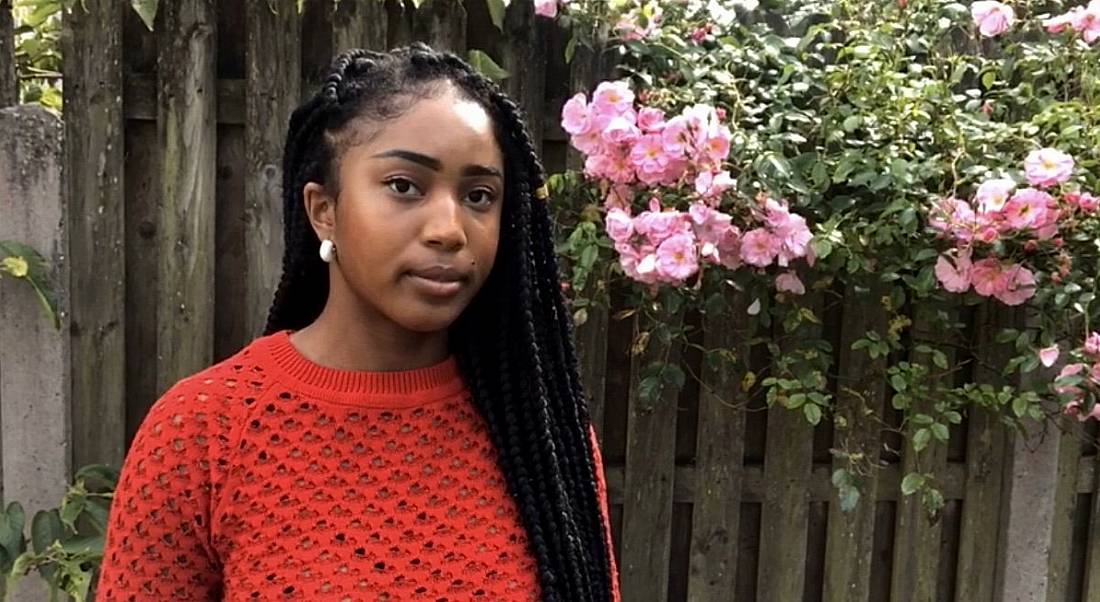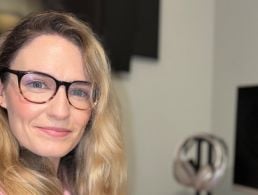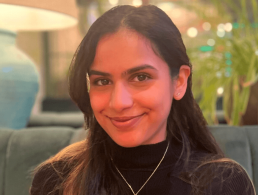Computer science graduate Oluchi Anyabuike, who is working at Fidelity Investments, was looking for support and opportunities in her first job after university.
Picking a graduate programme or your first big job after college can be challenging. What should you look out for? What opportunities could you expect?
Oluchi Anyabuike studied computer science and information technology at NUI Galway. She spent her third-year placement in Fidelity Investments, which gave her the chance to apply classroom knowledge in an industry setting for eight months. After finishing her placement, she completed Fidelity’s Leap graduate programme and went on to join the company as a full-time software engineer.
Here, Anyabuike says she was drawn to Fidelity because of the friends and connections she made during the Leap programme, as well as the opportunities for professional development that she saw in the company.
‘The level of support that was afforded to me from my very first day as an intern was striking’
– OLUCHI ANYABUIKE
What drew you to Fidelity Investments when you were seeking work as a graduate?
I had previously interned in Fidelity as part of the placement programme that is offered with my undergraduate degree. From that experience, I knew that Fidelity’s culture and positive work environment aligned with my values and that was where I wanted to begin my career.
The level of support that was afforded to me from my very first day as an intern was striking. I was assigned a mentor, who had recently graduated from the Leap programme, and she encouraged me to ask questions without fear of ridicule, enforcing the collaborative atmosphere within the company.
I also greatly admired the tools provided to associates to facilitate self-driven learning and professional development. These aspects and more contributed to my decision to join Fidelity.
What expectations did you have before you began the programme?
My experience may be slightly different to some of my fellow Leap associates, as I did not have many expectations or unanswered questions. We were invited to many roundtables as interns to put forward any questions we had about the programme before we even applied.
Furthermore, at the very beginning of the Leap programme you get the chance to discuss the different facets of the programme with a committee of Leap alumni at various stages in their career and they provide a valuable insight on what to expect at each stage.
What duties and responsibilities were you given initially?
Initially, the primary focus is to learn about Fidelity’s core values and the processes in place to maintain those integral parts of the culture here. Next, we learn about the business domain and how the technology we create helps to impact the lives of our clients.
Then we learn about the various tools, frameworks and methodologies used within the company and apply those in tangible ways by delivering and presenting a full-stack project at the end of the programme.
Did the scope of your work change as the programme progressed?
As the programme progressed, the primary focus was to apply what we learned in a tangible way. This manifested as a full-stack industry project provided by a business unit and delivered by a small team of Leap students.
Each team has a different project that addresses a different business problem. The final deliverable involves a brief presentation to our colleagues and members of the Ireland leadership team, including a formal handover to our business sponsors.
Throughout the project phase, the scope of work becomes more technical and includes liaising with external teams about different pieces of the project. This is a great experience for when you start working with your team after the programme ends as it provides great exposure to industry standards and best practices.
Can you describe a typical day in your current role?
Having joined my team directly after the Leap programme, my days now include more direct involvement with projects. I usually start my day by brewing a cup of tea before catching up on my emails.
We work using an Agile framework, so in our morning stand-up each individual team member discusses the work that is in progress. It lasts about 15 minutes and, if needed, it is followed by another 15 minutes where we collaborate on solving any issues that may prevent a story moving forward.
Generally, I spend the morning and early afternoon working on my stories and completing any non-technical work that needs to be done. Where needed, I set up meetings with my colleagues to discuss any issues I may be facing or approaches that I am taking. In this new remote working environment, it is sometimes easier to express oneself through a quick video call than trying to construct an email or chat message.
After lunch, I attend a quick check-in meeting with our US associates, which provides another opportunity for the team to reconvene. Depending on the day, we may also have planning, refinement or retrospective meetings to realign our goals for the week.
I usually have a few hours to get some more work done before meeting up with my Leap group. We try and meet at least once a week in the evenings to chat about our days and reminisce about the Leap programme days.
How do your responsibilities compare to more experienced employees?
My responsibilities are accurately scoped given my experience, but I am afforded the opportunity to take on more work where appropriate. For example, I would not be expected to deploy an application into a production environment but would be expected to deploy and test applications in non-production environments.
One of the first things I did after joining the team was to discuss my technical career goals, identifying which skills align with them and fit the team. This gave me a desired learning path, which I find very beneficial.
Do you feel more prepared for working life after completing the Leap programme?
The Leap programme undoubtedly prepares all participants for working in the technology and financial services industry. We are exposed to the latest technologies, frameworks and methodologies that are used within the industry and provided with a series of workshops to refine soft skills, which are equally important in professional life.
Given the nature of Fidelity’s business, an introduction to the financial services industry is issued in a myriad of engaging ways. Throughout the sessions and seminars, expertise in any area is not assumed and all instructors are very understanding of everyone’s capabilities. Your specific area of interest is also considered before you are placed on a team.
Most importantly, you are given the time to learn and adjust to all the nuances of working in a corporate space which can become increasingly difficult when working remotely.
Why should someone apply to the graduate programme at Fidelity?
Aside from all the technical benefits I have mentioned, Fidelity’s Leap programme is at its core a great network of peers in the industry. Not many people can say that they joined their company with about 20 friends with similar educational backgrounds and corporate experience. It alleviates the initial anxiety one may have when joining a new space.
Additionally, it is a global programme that occurs in every region where Fidelity has a presence, expanding the network even more. As the Leap programme has been taking place for several years there is a large network of Leap alumni at various levels in the company who regularly meet and discuss ways to improve the programme for the next group of associates.
The resources and support given during the programme are maintained throughout your career in Fidelity and opportunities arise where you can pay it forward to an incoming associate. Fidelity’s graduate programme is an exciting, educational avenue to join a thriving company.




